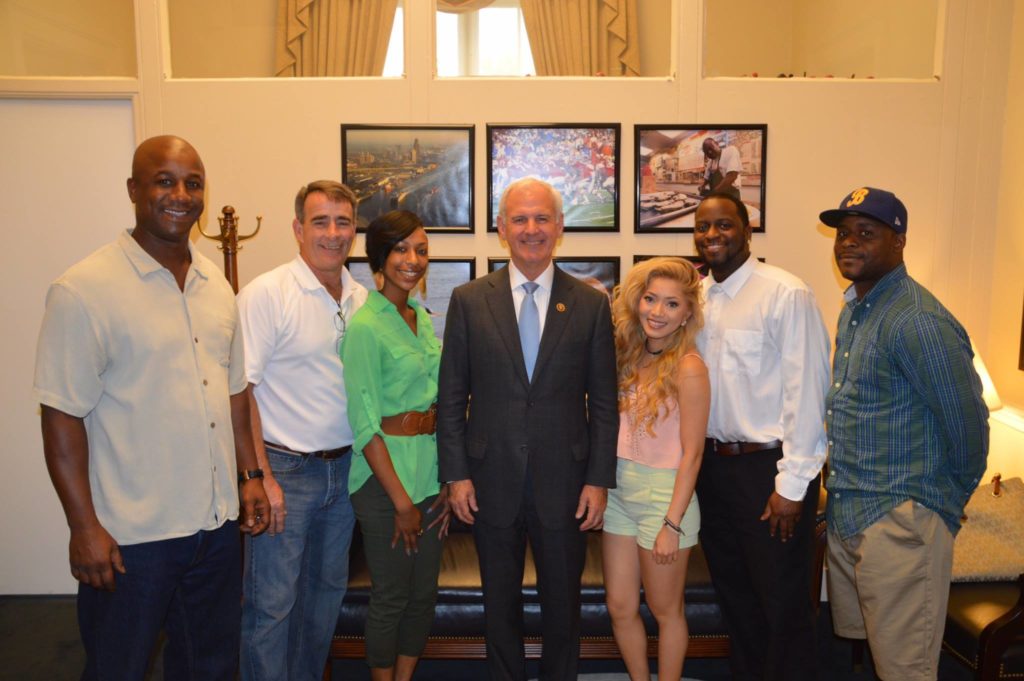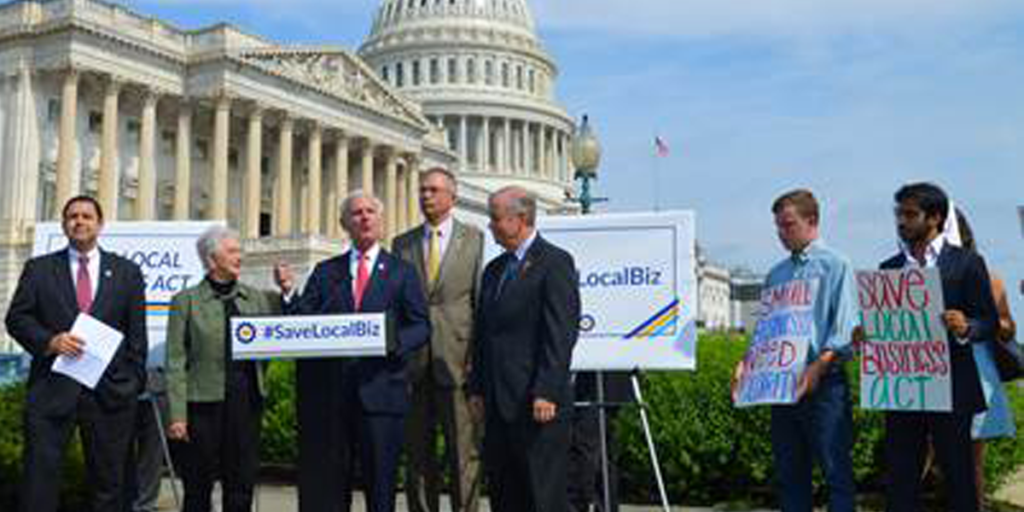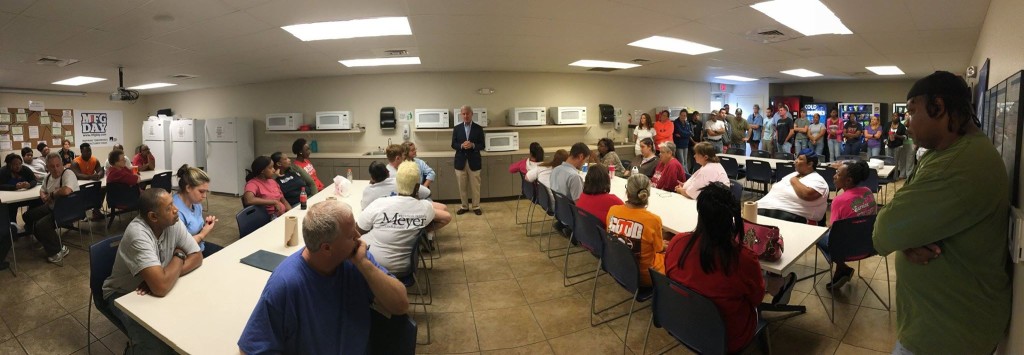Bob Omainsky: Alabama’s Bradley Byrne champions critical joint employer fix

In the South, we love football, family, and food — especially here in Alabama where we have one of the most decorated football teams in the country, family gatherings are our favorite time of the week, and our food is tasty and soulful. There is no better way to bring football, family, and food together than at your favorite local restaurant. Our restaurants are as spirited and rich as our traditions. Some have been in families and communities for generations while others have developed from new and fresh ideas. But one thing that each has in common is the vital role they play in our economy. Restaurants contribute to job creation and economic growth while providing essential workforce development opportunities. They’re where employees build skills that shape their future success. They serve as pillars within their communities and are a driving force not just for Alabama’s economy, but for the nation’s economy. Alabama has 7,845 eating and drinking locations that employ 185,300 people and contribute $8.1 billion in economic output. I find it troubling that any national policy would aim to hinder, or even eliminate, the industry’s growth potential. Unfortunately, a National Labor Relations Board (NLRB) decision to expand the joint employer definition did just that in 2015. Joint employer is the standard by which two or more businesses share control of an employee. Before 2015, business owners had a clear understanding of when they might be liable for another company’s employment actions. The long-established standard held that you must have “direct” and “immediate” control over another company’s workers. Under the new rule, it’s not as simple. Today’s definition is drastically-expanded, putting restaurants at legal risk with only the vaguely defined “indirect” or “potential” control over another company’s employees. Neither attorneys nor human resources professionals can agree on the scope of these terms — leaving business owners with little recourse but to buy more expensive and protective insurance and to reevaluate many of their business relationships altogether. Take, for instance, my nearly 80-year-old business, Wintzell’s Oyster House. If we hire an outside landscaping company to keep our lawns lush, I could be considered a joint employer if I show the landscapers where to mow. Or, if I contract a food supplier for certain ingredients, I could become part of a lawsuit if one of their workers complains about overtime pay. The uncertainty is nothing more than governmental overreach that is crippling eateries like Wintzell’s and discouraging growth throughout the restaurant industry. Thankfully, Alabama’s own Rep. Bradley Byrne has introduced bipartisan legislation that aims to roll back this confusing joint employer ruling and provide some much-needed clarity for millions of restaurants across America. Rep. Byrne and the more than 50 co-sponsors of H.R. 3441, the Save Local Business Act, understand the importance of having federal policies that help businesses grow and thrive for the good of our entire workforce. On behalf of the 1,117 restaurants in Alabama’s 1st District that employ 22,259 men and women, I would like to thank Rep. Byrne for his continued leadership and his effort to clarify the joint employer issue. This is a critical measure because after all, a stable employer environment will only make our restaurants that much better at bringing together football, family, and food for generations to come. ••• Bob Omainsky is owner-operator of Wintzell’s Oyster House, with three locations in the Mobile, Ala. area.
Bradley Byrne introduces bill to protect businesses, reverse controversial labor rule

Alabama 1st District U.S. Rep. Bradley Byrne introduced legislation Thursday to protect America’s local businesses by restoring the commonsense definition of what it means to be an employer, protecting companies from being held liable for labor law violations made by their subcontractors. H.R. 3441: The Save Local Business Act, endeavors to undo an Obama-era standard in which the National Labor Relations Board (NLRB) expanded the joint employer standard and thus increased businesses’ exposure to lawsuits and unionization efforts. Byrne’s bill would amend the National Labor Relations Act and the Fair Labor Standards Act to clarify that two or more employers must have “actual, direct, and immediate” control over employees to be considered joint employers. It would: Roll back a convoluted joint employer scheme that threatens job creation and undermines the American Dream. Restore a commonsense definition of employer to provide certainty and stability for workers and employers. Protect workers and local employers from future overreach by unelected bureaucrats and activist judges. “Federal labor policies should be focused on benefiting workers and helping small businesses grow instead of creating barriers that limit opportunity. Also important, Congress – not unelected federal bureaucrats – should set our nation’s labor policies through statute instead of executive fiat,” said Byrne. “Under this bipartisan legislation, workers, and the businesses they work for, will be given much needed clarity and certainty. I am especially pleased our legislation has earned support from both sides of the aisle, and I am committed to continuing to build momentum as the bill moves through the legislative process.” The bill has bipartisan support from 29 co-sponsors, including House Education and the Workforce Committee Chairwoman, North Carolina Republican Rep. Virginia Foxx. “Right now, local employers across the country face an enormous amount of uncertainty because of a vague and confusing joint employer standard,” commented Foxx. “Congress cannot sit on the sidelines while this harmful scheme threatens to destroy jobs and make it harder for entrepreneurs to achieve the American Dream of owning a business. I commend Congressman Byrne for his leadership in this bipartisan effort to protect jobs and the spirit of entrepreneurship in local communities.”
Bradley Byrne: The 21st century workforce

A lot has changed since the 1930s. For example, in 1938, Franklin Roosevelt was President, and you could buy a loaf of bread for ten cents. Since then, the Internet was invented, more jobs are based in technology, and almost every American has a cell phone. Sadly, some of our nation’s most important labor laws, like the Fair Labor Standards Act, date back to the 1930s. One could argue that the needs of the workforce have changed a lot in just the last decade, but they have most certainly changed over the last eighty years. Clearly, something is still holding our economy back. Since 2009, the economy has grown at an average annual pace of just 1.5 percent. Wage growth remains largely stagnant, as the average hourly earnings for today’s worker is roughly the same as they were in 2009. Meanwhile, 7.6 million Americans are searching for work, and nearly six million individuals are working part-time hours when they really want full-time jobs. Our outdated labor laws and policies play a significant factor in limiting economic growth, and it is time we examine how to reform these important laws to allow for more flexibility for workers in the 21st Century. This is a topic I covered last week in my first hearing as Chairman of the House Subcommittee on Workforce Protections. The American workforce has transformed dramatically since some of our labor laws were passed, and the challenges facing workers and employers today are substantially different than they were in the 1930s. However, our labor policies have failed to adapt. Our confusing and outdated labor policies are especially harmful to small businesses. Big businesses and large corporations often have entire divisions and lawyers set aside to figure out how to comply with rules and regulations. Smaller businesses, which make up the overwhelming majority of our economy in Southwest Alabama, do not have the same resources. When small businesses suffer, American workers suffer. It is clear our nation’s labor rules were designed for another era and no longer reflect the realities of the 21st Century workforce. That’s why it is so disappointing the Obama Administration missed an opportunity to streamline and modernize these important worker protections. Instead, the previous administration spent its time and resources advancing an extreme and partisan agenda that would stifled workplace flexibility and limited opportunities for career advancement. We must do better. Thankfully, we are in a new era now, and I am optimistic the Trump Administration will pursue policies that benefit American workers. Just last week, President Trump announced his nomination of Alexander Acosta to serve as Secretary of Labor. From his time on the National Labor Relations Board to his service as a U.S. Attorney, Mr. Acosta has a clear record of protecting American workers and upholding the law. As Chairman of the Workforce Protections Subcommittee, I am committed to working with Mr. Acosta to find solutions to update our labor and workplace laws and help bring them into the 21st Century. Just as important, I want to find ways to eliminate confusion and uncertainty that make it harder for small businesses to grow and expand. We cannot accept the economic struggles of the last few years as the new normal. The American people have clearly spoken, and they expect their leaders in Washington to put the country on a better path and finally get the economy moving again, which means more and better paying jobs. That is a top priority for me and our unified Republican government. I look forward to making a positive impact on behalf workers in Southwest Alabama and across the country. • • • Bradley Byrne is a member of U.S. Congress representing Alabama’s 1st Congressional District.
Bradley Byrne: We must rein in overreach at the Department of Labor

A big problem with our country today is that the government and federal bureaucrats always seem to think they know what is best. This is flawed logic because government was created to serve the people, not the other way around. Unfortunately, government agencies seem to forget that. This is certainly true when it comes to the Department of Labor and the National Labor Relations Board. The National Labor Relations Board (NLRB) is an independent federal agency responsible for setting policies related to labor practices and unions. The NLRB was formed in 1935, but has seen its power increase in recent years. The Department of Labor and the NLRB exist for the purpose of protecting American workers. Unfortunately, they have abused their powers in an effort to exert more control over businesses and workers. The Obama Administration has used the Department of Labor and the NLRB to upend decades of legal precedent by issuing aggressive decisions and regulations. Sadly, these actions have put the interests of big labor bosses ahead of what is best for hardworking Americans. These actions are especially challenging to small and medium sized businesses who lack the money and resources to devote to compliance with the patchwork of federal laws, regulations, policies, and decisions. I hear far too often from small businesses right here in Southwest Alabama who have been negatively impacted by the Obama Administration’s labor policy. As a member of the House Education and the Workforce Committee, I have been working to fight back against this overreach and abuse. The Committee has held numerous hearings on labor issues, including a field hearing last August in Mobile. We have also passed legislation that would block some of the most onerous proposals from moving forward, but many of our bills have been vetoed by President Obama. So, we must find ways to work around the President’s veto pen. One of the most powerful tools we have in Congress is the power of the purse. Almost all federal agencies and programs require funding from Congress. If the Obama Administration isn’t following the law or is overreaching, we should cut or withhold funding to the related agency. With this in mind, I recently sent a letter to the House Appropriations Committee, which is responsible for writing the annual funding bills, asking that they address four major labor issues in this year’s funding legislation. I was honored to have 72 of my Republican colleagues from every corner of the United States sign my letter to show strong support for reining in overreach by the Department of Labor and the NLRB. That shouldn’t be where we stop though. We must continue pushing for standalone legislation to protect worker rights and ensure fairness in the workplace. I am especially proud to support the Employee Rights Act. The Employee Rights Act would make wholesale reforms to bring our nation’s labor laws up to date. Among the many reforms, this bill would guarantee secret ballot votes on any initial decision to join a union, require unions to get positive consent from members before using union fees for political purposes, and protect employees against union intimidation or retaliation. An appropriate union-employee relationship is critical to having a strong economy. We should always ensure that hardworking Americans and small business owners, not big union bosses, are deciding what is best for their business. I promise you this: I will continue fighting every day against overreaches by the Obama Administration and keep working to protect American workers. That is what you elected me to do. • • • Bradley Byrne is a member of U.S. Congress representing Alabama’s 1st Congressional District.
Bradley Byrne: Manufacturing on the rise, but challenges remain

As I was touring the manufacturing operation at Quality Filters in Robertsdale, I was struck by just how much manufacturing has grown in Southwest Alabama over the last decade. I paid a visit to Quality Filters to help celebrate National Manufacturing Day, which took place on October 2nd. We have seen a large increase in manufacturing all over Alabama, driven by our growth in the motor vehicle, chemical, and aerospace industries. In 2014, over 250,000 Alabamians worked in manufacturing. These manufacturing jobs paid an average of $60,945 while the average pay for other non-farm businesses was $41,089. All told, manufacturing had a $34.4 billion impact on Alabama’s economy. Despite these impressive gains, manufacturers in Southwest Alabama and across the country are facing a wide range of challenges brought on by the federal government. Whether it is the EPA, IRS, NLRB, or OSHA, manufacturers must deal with regulations from an alphabet soup of federal regulators. Even if you don’t work for a manufacturer, that does not mean these regulations won’t impact you. The regulatory costs are often passed on to the consumer in the form of higher prices or fewer options. The Environmental Protection Agency (EPA) is likely the biggest foe of manufacturing. Given the nature of the industry, manufacturers use a third of our nation’s energy, so they depend on affordable energy prices. Unfortunately, it seems like every day the EPA is putting out a new regulation that will drive up energy costs. Take the EPA’s new ozone standard for example. The new standard is misguided and will be incredibly costly for our nation’s manufacturers. In fact, the new standard is so low that even some national parks could be out of compliance. At a time when ozone levels have already been reduced, it makes no sense to place additional burdens on our job creators. In Congress, I have been a strong supporter of the REINS Act. This commonsense legislation would require Congressional approval of any regulation with an annual economic impact of $100 million or more. Many of the EPA’s proposed rules would fall under this category, and I am certain the Republican-controlled Congress would stop these costly regulations from moving forward. The National Labor Relations Board (NLRB) has also attempted to increase the number of labor regulations impacting manufacturers. The NLRB’s “ambush elections” rule will shorten the time it takes to hold a union election and make the personal contact information of employees publicly available to union representatives. Earlier this year, the House and the Senate passed legislation to block the ambush election rule from going into effect. Unfortunately, President Obama vetoed the bill, and the Senate did not have the votes to override the veto. Despite that setback, we are continuing to push back against frivolous NLRB regulations on manufacturers. Another challenge to manufacturers comes in the form of a growing skills gap. Our nation is currently experiencing a shortage of skilled workers to fill certain manufacturing jobs. Without access to enough skilled workers, it’s becoming harder and harder for manufacturers to grow and expand their operations. As a member of the House Education and the Workforce Committee, I have made it a top priority to improve our nation’s job training programs. We need to encourage collaboration between the private sector and institutions of higher learning, specifically community colleges and trade schools. This will help close the skills gap and give more Americans access to high paying jobs. So while manufacturers are facing some significant challenges, there are also those of us in Congress who are committed to supporting manufacturing. So whether it is Quality Filters or other businesses in our area, I will do everything I can to support manufacturing and the thousands of jobs associated with the industry. Bradley Byrne is a member of the U.S. Congress representing Alabama’s 1st Congressional District.
Bradley Byrne: Putting small business over big labor

“I now find myself in the position that an unelected board in Washington, D.C., can just unilaterally determine that my American dream is over.” Those were the words of Chris Holmes, owner and operator of Firehouse Subs restaurants in the Florida panhandle, during a House Education and the Workforce Committee field hearing in Mobile. As a member of the Committee, I worked with my colleagues to convene a field hearing in Mobile to examine the latest attempt by President Obama and his National Labor Relations Board (NLRB) to dramatically change our nation’s labor laws. The NLRB is an independent federal agency responsible for setting policies related to labor practices and unions. Field hearings are just like any other Congressional hearings we would have in Washington except we have them back home in our local communities. They allow us to get closer to the actual people who are impacted by the policies that are being debated in Washington. In other words, it brings the issues down to Main Street. That was especially important on this issue, which will have a direct impact on local small business owners and their employees. The hearing focused on a proposal to completely change the definition of a “joint-employer” under the National Labor Relations Act. While this issue may sound complicated, let me explain why it should matter to every American. A lot of people in Southwest Alabama work for franchisees, which is someone who owns a local business that is an affiliate of a big national brand. For example, someone in Escambia County may own a local franchise of McDonalds or another fast food restaurant. The people who work for them are not employees of the fast food chain, but they are employees of a local small business person who owns that individual store. The issue isn’t limited to just fast food. One of the people who testified at our field hearing in Mobile is a veteran who owns a residential painting company that is part of a larger franchise operation. These franchise relationships are really common and very important to the local economy and our national economy. They give thousands of individuals upward mobility and the opportunity to be successful business owners. What the National Labor Relations Board is attempting to do is say that anybody who is currently a franchisee employee will no longer be an employee of that local business owner, but instead they will be the employee of the larger, national company. This fundamentally alters three decades of legal precedent. The Wall Street Journal explained that the NLRB is attempting to “radically rewrite U.S. labor law and upend thousands of business relationships.” This decision could crush the dream of hardworking Americans, like Chris Holmes, who have always aspired to own a small business. This action by the NLRB could increase the liability of doing business and change the franchisor-franchisee relationship. Another franchisee testified that the NLRB’s action would give him “less independence and less control over the business that I worked so hard to build.” Worst of all, this wouldn’t just be bad for small business owners, but it would hurt the thousands of people who work for small businesses. Instead of having a boss who knows you and understands your problems, now your boss may be a corporate CEO who has never even stepped foot in your local business. President Obama and the NLRB have yet again sided with Big Labor over what is in the best interest of the American people, but Congress won’t stand by idly. I look forward to working with my colleagues on the Education and the Workforce Committee to roll back this flawed decision and stand up for hardworking Americans. Bradley Byrne is a member of the U.S. Congress representing Alabama’s 1st Congressional District.

